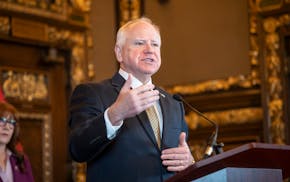HomeServices of America might be the biggest real estate company even homebuyers and sellers don't know.
The Twin Cities-based firm is the behemoth, behind-the-scenes owner for some of the nation's biggest and most popular real estate brands, including Edina Realty. The company, one of several Berkshire Hathaway Energy companies, has grown by acquiring dozens of national brokerages, which retain their local brand and image.
That unusual strategy is the legacy of HomeServices founder Ron Peltier, who stepped aside as CEO in 2019. Now, HomeServices has a new leader: Chris Kelly, the former executive vice president of the company, which recently ranked as the fourth largest in the nation, according to Real Trends.
Kelly takes the reins in the wake of an especially turbulent time for the industry. Last year, as part of a historic legal settlement with the National Association of Realtors (NAR), HomeServices agreed to pay $250 million into the settlement fund.
The industry is also grappling with new NAR policies aimed at providing more clarity — and, some would say, restrictions — around when agents can start marketing a property before listing on the Multiple Listing Service (MLS).
In an interview edited for clarity and length, Kelly shares where he intends to take company.
Any truth to recent reports Compass is in talks to acquire HomeServices?
There is no pending or contemplated transaction between HomeServices and Compass or any other third party. We are excited about the continued growth of our brands, companies and agents.
What's your immediate focus?
The two things for us that are really going to be important moving forward, and they are tied together: One of them is simplifying the way we operate. The margins have certainly continued to shift and evolve in real estate, and so we have to operate much more efficiently in order to continue to raise the bar on the services provided by agents and the services that we provide to consumers. I'll be starting the process of streamlining the back rooms of our companies.
The next phase of that is certainly making sure the technologies and tools we deploy for our agents and consumers becomes more a singular HomeServices offering, as opposed to 40 disparate offerings.
How do you accomplish that?
HomeServices has historically been kind of the company that makes an acquisition and then sneaks away in the middle of the night. That's starting to evolve a little bit. But historically, it was not a forward-facing brand for sure.
Real estate is very local still, but it has taken on a very national flavor over the last five to 10 years. For HomeServices to adequately compete and to excel over the next decade, we need to develop what is the HomeServices offering for the agent and consumer but push that through to the local brands, into the local culture and everything that makes you known in your market.
Will the HomeServices brand be more prominent?
I think it needs to. So when HomeServices says something that's related to the industry news, people know what that is, and they know what that means so that we can talk in that singular voice. So I do think it's more important as we move forward that HomeServices itself has a voice in the conversation.
We used to really just concentrate on a local level, but there are now national conversations. An example of that would be last year with the rule changes announced by NAR. That is all happening at a national scale, which means whatever you're doing in Mobile, Ala., is the same thing you're doing in Minneapolis as well. The speed at which these changes are coming certainly accelerated.
How does technology impact HomeServices' future?
We want to partner with the right, select few number of these technology specialists to build out our tool stack that we offer agents and consumers.
I really think what our philosophy moving forward is going to be: Do less, but do less better. What are the things that really matter to an agent or a consumer when they are using technology in real estate?
The technology should support that model. That's what we're after.
The ability for the consumer and the agent, through a singular application, to be able to see all of the milestones that are happening within their real estate transaction. If you bought a car the way that people are asked to buy a house, it would feel very troubling.
In your previous role, you partnered with Zillow's Showcase initiative, which lets agents pay a little extra for a more tricked-out listing. Is Zillow a vendor or competitor?
Millions of unique viewers are on Zillow on a daily basis, so we wanted to give our agents the opportunity to best position their listings and their sellers' properties.
It's probably a little bit of both. The lines get blurred a little bit. I would say historically, we've had a really good working relationship with them. Many of our companies use products that are now owned by Zillow.
Has the NAR lawsuit had any impact on how houses are bought and sold?
Even though most of us could buy a car online, the vast majority — about 80% of us — still go to a dealership and talk face to face to another human to go through that transaction. Buying a home or selling one is even more emotional and a bigger financial commitment, so that part of it is really, really sticky. And so the thought that somehow the consumer was being forced into these relationships with the agents was never valid, in my opinion.
The rule changes have allowed agents and brokerages to have conversations with consumers way sooner in the process. The sellers have shown they're still very comfortable with the manner in which these transactions are structured.
HomeServices has a much more national reach since its start in the Twin Cities. You also live and work in Florida. Any plans to relocate?
The largest presence at HomeServices is still in the Twin Cities, and it will remain that way. Our Shared Success Center, which is all of our combined back rooms for all of our operations, is right there in Eden Prairie. We moved the remaining corporate team into that facility, so we've got a long-term commitment to be in the Twin Cities.
Our companies are all over the country, so my job is to be out there with the companies most of the time. So I'm kind of bouncing around all over the place. My home base will still remain here in Florida.

Delta hiked fares for solo travelers, until Twin Cities travel experts caught the change

In first speech back, UnitedHealth's new CEO pledges to review hot-button issues

A child had measles at Mall of America, concerning state health officials who don't know source

Ramstad: Gov. Walz, things are not getting done in Minnesota

